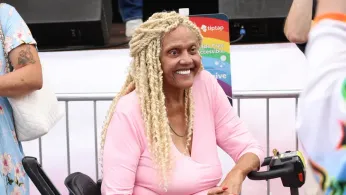
5 hours ago
Stonewall Legend Miss Major Griffin-Gracy Hospitalized With Blood Clot and Sepsis
READ TIME: 3 MIN.
Miss Major Griffin-Gracy, renowned for her unwavering advocacy for transgender people and her role as a survivor of the 1969 Stonewall uprising, has been hospitalized with a blood clot and sepsis. The news was publicly shared by her partner, Beck Witt Major, via Facebook, sparking concern and solidarity from across the LGBTQ+ community and beyond. As of October 1, 2025, Miss Major has been in the hospital for over 12 days, facing a serious medical situation that has mobilized both local and global supporters to rally for her care and recovery .
Miss Major, a Black genderqueer transgender woman, has been a force in LGBTQ+ activism for over five decades. Born in 1940, her activism began in the context of the Stonewall uprising, a historic moment widely recognized as a catalyst for the modern LGBTQ+ rights movement. Surviving police violence and discrimination, Miss Major became a mentor and advocate for transgender people, particularly those who are incarcerated or living with HIV/AIDS. She has repeatedly emphasized the importance of community care and the need for systemic change to address the intersecting oppressions faced by transgender people of color .
Her work has included serving as the first executive director of the Transgender Gender-Variant and Intersex Justice Project (TGIJP), which advocates for the rights of transgender, gender-variant, and intersex people in prisons and jails. Under her leadership, TGIJP became a lifeline for countless individuals, especially trans women of color who were frequently isolated and at risk in the criminal justice system .
Throughout her career, Miss Major has also been a prominent advocate for people living with HIV/AIDS, working with multiple organizations to provide support and visibility to those often neglected by mainstream services .
Miss Major’s influence extends far beyond organizational leadership; she is widely regarded as a “trans mother” and mentor to generations of activists. Her life story—marked by personal hardship, including periods of incarceration herself—became a beacon for those seeking resilience and hope. Janetta Johnson, current CEO of TGIJP, credits Miss Major for her personal and professional growth, describing the activist as a source of unconditional support and fierce advocacy for Black transgender women and all marginalized members of the LGBTQ+ community .
In addition to her activism, Miss Major is a parent to a young son and has continually emphasized the importance of family, chosen or biological, in community survival and healing .
Even amid ongoing health challenges—including a stroke in 2019 and a need for 24-hour nursing care reported earlier this year—Miss Major has remained active in LGBTQ+ advocacy. In 2024, she delivered a passionate speech to the LGBTQ+ Caucus at the Democratic National Convention in Chicago, urging the community to resist political backlash and defend hard-won rights. Her public endorsement of Kamala Harris for president highlighted her ongoing commitment to political engagement .
Her legacy also includes contributions to media and literature. She executive-produced the documentary series “Trans in Trumpland,” authored “Miss Major Speaks” with Toshio Meronek, and founded the House of GG-TILIFI, a retreat and leadership center for trans and gender-nonconforming people in the Southern United States . In 2024, she was honored as grand marshal of the New York City Pride March, reflecting her enduring impact on the movement .
The news of Miss Major’s hospitalization has prompted a surge of solidarity and support. A crowdfunding campaign has been launched to help cover her medical expenses, with many in the LGBTQ+ community and allied networks contributing and sharing messages of gratitude and concern . According to friends and colleagues, supporting Miss Major in her time of need is both a tribute to her legacy and a vital act of community care.
Those wishing to assist can find further information and make contributions via the official crowdfunding page at https://fundly.com/missmajor .
Miss Major’s current health crisis underscores the broader challenges faced by LGBTQ+ elders, especially Black transgender women, who have often given decades of service to their communities with little institutional support or security in later life. Advocates stress that ensuring the well-being of elders like Miss Major is essential not only for honoring their individual contributions but also for sustaining the movement’s intergenerational strength .
Her story serves as a reminder of the resilience, courage, and ongoing struggles within transgender and gender-nonconforming communities. As supporters await updates on her recovery, Miss Major’s legacy continues to inspire activism, solidarity, and hope for a more just and inclusive future.






